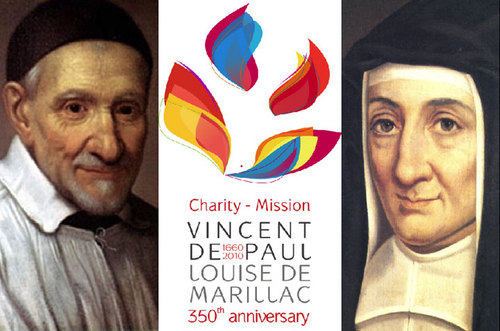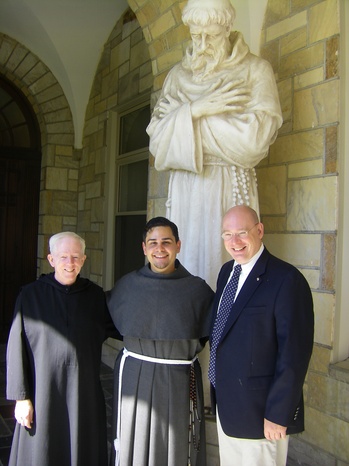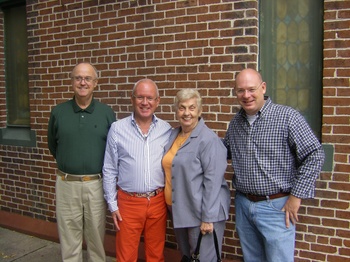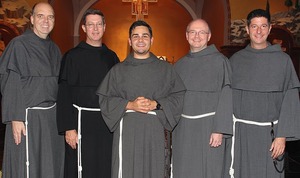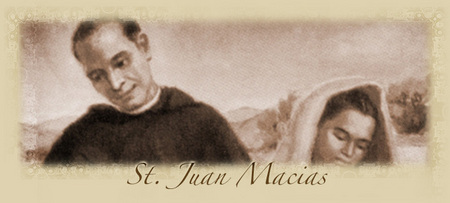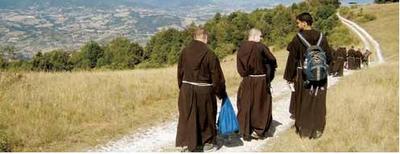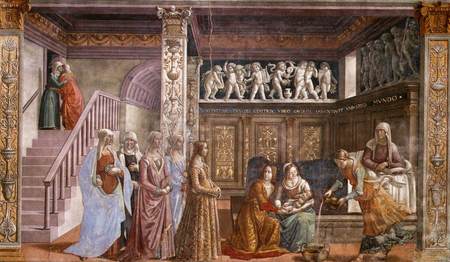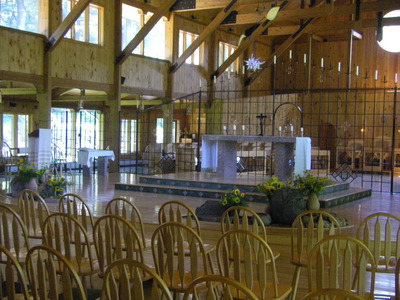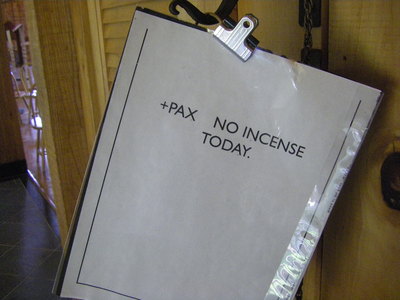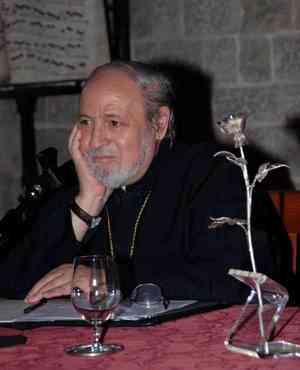 On 22 September 2010, a giant in the world of
ecumenism and Eastern Christianity died after living with illness. No one can
doubt the sentiment expressed by the Pope saying that Monsignor Fortino had a "generous
commitment with intelligence and passion at the service of unity." The Pope
last saw Monsignor Fortino on June 28 with the delegation of the Ecumenical
Patriarch Bartholomew I. A telegram was sent through his secretary of state,
Cardinal Tarcisio Bertone, honoring the life of the undersecretary (third in
charge) of the Pontifical Council for Promoting Christian Unity, who focused
particularly on relations with the Orthodox Churches.
On 22 September 2010, a giant in the world of
ecumenism and Eastern Christianity died after living with illness. No one can
doubt the sentiment expressed by the Pope saying that Monsignor Fortino had a "generous
commitment with intelligence and passion at the service of unity." The Pope
last saw Monsignor Fortino on June 28 with the delegation of the Ecumenical
Patriarch Bartholomew I. A telegram was sent through his secretary of state,
Cardinal Tarcisio Bertone, honoring the life of the undersecretary (third in
charge) of the Pontifical Council for Promoting Christian Unity, who focused
particularly on relations with the Orthodox Churches.
September 2010 Archives
 On 22 September 2010, a giant in the world of
ecumenism and Eastern Christianity died after living with illness. No one can
doubt the sentiment expressed by the Pope saying that Monsignor Fortino had a "generous
commitment with intelligence and passion at the service of unity." The Pope
last saw Monsignor Fortino on June 28 with the delegation of the Ecumenical
Patriarch Bartholomew I. A telegram was sent through his secretary of state,
Cardinal Tarcisio Bertone, honoring the life of the undersecretary (third in
charge) of the Pontifical Council for Promoting Christian Unity, who focused
particularly on relations with the Orthodox Churches.
On 22 September 2010, a giant in the world of
ecumenism and Eastern Christianity died after living with illness. No one can
doubt the sentiment expressed by the Pope saying that Monsignor Fortino had a "generous
commitment with intelligence and passion at the service of unity." The Pope
last saw Monsignor Fortino on June 28 with the delegation of the Ecumenical
Patriarch Bartholomew I. A telegram was sent through his secretary of state,
Cardinal Tarcisio Bertone, honoring the life of the undersecretary (third in
charge) of the Pontifical Council for Promoting Christian Unity, who focused
particularly on relations with the Orthodox Churches.
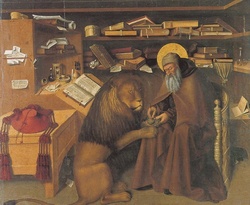 At Mass today the preacher told us of a vision Saint Jerome had of Christ who asked him: Are you going to follow Cicero or me? (Jerome was educated in Latin literature and was a "student" of Cicero.) We know the end of the story for Jerome, but what of each of us?
At Mass today the preacher told us of a vision Saint Jerome had of Christ who asked him: Are you going to follow Cicero or me? (Jerome was educated in Latin literature and was a "student" of Cicero.) We know the end of the story for Jerome, but what of each of us?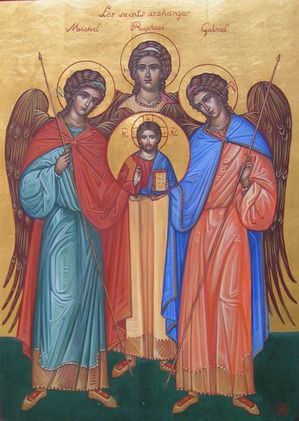 Our Catholic faith teaches us that angels have a general and yet an important part to play in our salvation history, especially personally guiding us. Moreover, the Archangels Michael, Gabriel and Raphael are given to us by God for very specific purposes and they are the only angels named in sacred Scripture.
Our Catholic faith teaches us that angels have a general and yet an important part to play in our salvation history, especially personally guiding us. Moreover, the Archangels Michael, Gabriel and Raphael are given to us by God for very specific purposes and they are the only angels named in sacred Scripture.
And so today, the Church honors the archangels, invokes their intercession and relies on their assistance in the spiritual warfare we daily face.
In Hebrew, "Michael" means "Who is like God?" Saint Michael is mentioned four times in Scripture: Daniel 10 and 12, in Jude and in Revelation. Scripture reveals to us that Saint Michael is known as the "Prince of the Heavenly Host," hence, the leader of all angels. It is to the Prince of the Heavenly that we owe a debt of gratitude for casting down to Hell Lucifer and the evil spirits; he is invoked for protection against Satan and all evil.
Sacred Tradition teaches that there are four offices connected to Saint Michael:
- to fight against Satan, his minions and the power of evil
- to rescue and protect the faithful from evil, especially at the hour of death
- to lead the people of God to full communion with God Himself
- to call our souls to judgment before God.
We know the archangel from his announcement of the dawn of salvation to Mary: "I am Gabriel, who stand before God" (Luke 1:19). What is crucial to remember about Gabriel are his two announcements in the New Testament: the birth of John the Baptist to his father Zachary and of the Incarnation, the Word made flesh in Mary. Saint Gabriel, whose name means "God's strength," is also mentioned four times in Scripture.
Again, sacred Tradition tells us that it is Saint Gabriel who appeared to Saint Joseph and to the shepherds. At the beginning of the Passion it was Gabriel who "strengthens" Jesus in the his agony of the garden.
"I am the angel Raphael, one of the seven, who stand before the Lord" (Tobit 12:15)
Saint Raphael, whose name means "God has healed" because of his healing of Tobias' blindness in the Book of Tobit. This book in the Old Testament is the only book in which Raphael is mentioned. He is the archangel of healing and acts of mercy. Tradition tells us that Saint Raphael is the angel in John 5:1-4 who descended upon the pond and bestowed healing powers upon it so that the first to enter it after it moved would be healed of whatever infirmity he was suffering.
As point of trivia, the Catholic hospital in New Haven, CT is named for Saint Raphael, likely the only one in the USA.
Those familiar with what is called the "old Mass" will remember praying the Prayer to Saint Michael at the conclusion of Mass. In 1899, after a vision of evil, Pope Leo XIII wanted to protect the Church and instructed that his prayer be prayed by all, especially the priest. I can't recommend the prayer enough to you when making your thanksgiving following Mass or the Divine Office. Plus, I would recommend that you pray the Prayer to Saint Michael prior to going to bed.
Saints Michael, Gabriel and Raphael, pray for us.
We are all pilgrims; we are all called to seek the face of God; we are all called to follow the Divine Other; we are called to dine richly on the divine gift of the Eucharist, the Food for the journey (viaticum) and to rest on the heart of Christ. I remember my religious superiors telling me that in making a pilgrimage Saint Ignatius of Loyola laid more emphasis on what happened to one's heart during the pilgrimage than merely getting to the destination. While getting to a holy place is important it ranks second to the conversion of heart that is hoped for during the pilgrimage experiment. How true. It wouldn't matter if you got to Santiago de Compostella or not if your heart wasn't radically changed according to the mind of Christ. My dream is to make the pilgrimage to the great shrine of Saint James, the place of the Lord's friend; I pray for the grace that my heart be turned inside-out. In the meanwhile, I'll make the road to the confessional my walk in the Way of Christ. The pope sets the stage for a pilgrimage spot is and how we Catholics are to be as welcoming as Christ is to the pilgrim. Read a portion of the Pope letter to the bishop and people of Compostella:
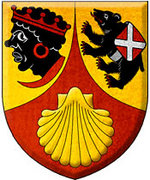
With great pleasure I would like to express my spiritual closeness to the congress participants to encourage and accompany them in carrying out a pastoral task of such great importance in ecclesial life. I will personally make a pilgrimage soon to the tomb of the Apostle Saint James, the "Lord's friend", in the same way that I have made my way to other places in the world which many of the faithful visit with fervent devotion. In this regard, from the beginning of my pontificate, I have wanted to live my ministry as the Successor of Peter with the sentiments of a pilgrim who travels over the roads of the world with hope and simplicity bringing on his lips and in his heart the saving message of the Risen Christ, and strengthening his brothers in faith (cf. Lk 22:32). As an explicit sign of this mission, my coat-of-arms includes the pilgrim's shell, among other elements.
In these historic moments in which we are called, with greater force if possible, to evangelize our world, the riches offered to us by the pilgrimage to shrines should be highlighted. First of all, for its great ability to summon and bring together a growing number of pilgrims and religious tourists, some of whom are in complicated human and spiritual situations, somewhat distant from living the faith and with a weak ecclesial affiliation. Christ speaks to all of them with love and hope. The desire for happiness that is imbedded in the soul finds its answer in Him, and human suffering together with Him has a meaning. With his grace, the noblest causes also find their complete fulfillment. As Simeon met with Christ in the temple (cf. Lk 2:25-35), so too a pilgrim should have the opportunity to discover the Lord in the shrine.
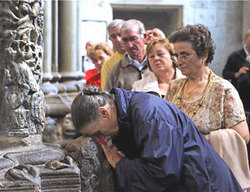
For this purpose, efforts should be made so that visitors may not forget that shrines are sacred places in order to be in them with devotion, respect and propriety. In this way, the Word of Christ, the Son of the living God, can ring out clearly, and the event of his death and resurrection, the foundation of our faith, can be proclaimed completely. Very careful attention should also be given to welcoming the pilgrims, by highlighting, among other elements, the dignity and beauty of the shrine, the image of "God's dwelling... with the human race" (Rev 21:3), the moments and spaces for both personal and community prayer, and attention to devotional practices. In the same way, it can never be stressed enough that shrines should be lighthouses of charity, with unceasing dedication to the neediest through concrete works of solidarity and mercy, and constant readiness to listen, favoring in particular the faithful's reception of the Sacrament of Reconciliation and taking part worthily in the Eucharistic celebration, making this the center and apex of all the pastoral activity of the shrines. In this way it will be made manifest that the Eucharist is indeed the pilgrim's nourishment, the "Sacrament of the God who does not leave us alone on the journey but stays at our side and shows us the way" (Homily on the Solemnity of Corpus Christi, May 22, 2008).
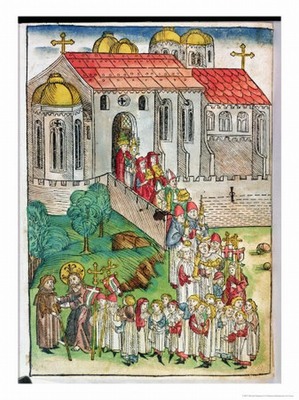
In fact, different from a wanderer whose steps have no established final destination, a pilgrim always has a destination, even if at times he is not explicitly aware of it. And this destination is none other than the encounter with God through Christ in whom all our aspirations find their response. For this reason, the celebration of the Eucharist can really be considered the culmination of the pilgrimage.
As "God's co-workers" (1 Co 3:9), I exhort all of you to be dedicated to this beautiful mission so that through your pastoral care, you will favor in pilgrims the knowledge and imitation of Christ who continues to walk with us, enlighten our lives with his Word, and share with us the Bread of Life in the Eucharist. In this way, the pilgrimage to the shrine will be a favorable occasion to strengthen the desire in those who visit it to share the wonderful experience with others of knowing they are loved by God and sent to the world to give witness to that love.
The Vatican, September 8, 2010Benedictus PP. XVI
In the Pope's Weekly Sunday Angelus Address (September 26, 2010) he spoke of Saint Vincent de Paul. Sunday's gospel of the parable of the rich man and Lazarus gave Benedict XVI a perfect context by which to teach that us that "God loves the poor and raise them from their abjection; secondly, that our eternal destiny is dependent upon our behavior, it is up to us to follow the path God has shown us in order to achieve live, and this path is love, understood not as emotion but as service to others in the charity of Christ," and further the Pope said:
"By a happy coincidence, tomorrow (9/26/2010) we will celebrate the liturgical memorial of St. Vincent de Paul, patron of Catholic Charities, which marks the 350th anniversary of his death. In France of 1600, he touched with his hand the sharp contrast between the richest and poorest. In fact, as a priest he was able to attend both the aristocratic circles, campaigns, as well as the slums of Paris. Driven by the love of Christ, Vincent de Paul was able to organize stable forms of service to the marginalized people, giving rise to so-called "Charitees," the "Charity," i.e., groups of women who put their time and property available to more marginalized. Among these volunteers, some chose to devote themselves completely to God and the poor, and thus, along with St. Louis de Marillac, St. Vincent founded the "Daughters of Charity," the first female congregation to live their consecration "in the world," among all the people, the sick and needy."
Strive to live content in the midst of those things that
cause your discontent. Free your mind from all that troubles you, God will take
care of things. You will be unable to make haste in this [choice] without, so
to speak, grieving the heart of God, because he sees that you do not honor him sufficiently
with holy trust. Trust in him, I beg you, and you will have the fulfillment of
what your heart desires (St. Vincent de Paul, Letters).
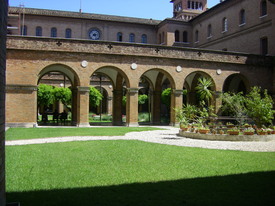 For a number of years now, when I am in Rome, I stay at the Benedictine Abbey of Sant'Anselmo on the Aventine Hill. The Benedictine monks have been on the Aventine since property was purchased from Pope Leo XIII in the late 19th century. Technically, Sant'Anselmo is not a functioning abbey as other abbeys with a stable monastic community but it's a house of studies for monks and others. There is an order for the day of prayer, Mass, study, and work but one does not become a monk of Sant'Anselmo as you would become a monk of Saint Vincent's. At the Anselmo you'll find a "permanent" faculty and staff, and a group of monks who work in the Abbot Primate's offices and some monks who work at other universities or at the Vatican, but no monk vows stability to Sant'Anselmo.
For a number of years now, when I am in Rome, I stay at the Benedictine Abbey of Sant'Anselmo on the Aventine Hill. The Benedictine monks have been on the Aventine since property was purchased from Pope Leo XIII in the late 19th century. Technically, Sant'Anselmo is not a functioning abbey as other abbeys with a stable monastic community but it's a house of studies for monks and others. There is an order for the day of prayer, Mass, study, and work but one does not become a monk of Sant'Anselmo as you would become a monk of Saint Vincent's. At the Anselmo you'll find a "permanent" faculty and staff, and a group of monks who work in the Abbot Primate's offices and some monks who work at other universities or at the Vatican, but no monk vows stability to Sant'Anselmo.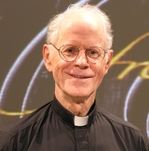 I recommend to your prayers the peaceful repose of the soul of Father Thomas Dubay, SM, who died yesterday morning in Washington, DC. Father Dubay has been ill for some time.
I recommend to your prayers the peaceful repose of the soul of Father Thomas Dubay, SM, who died yesterday morning in Washington, DC. Father Dubay has been ill for some time.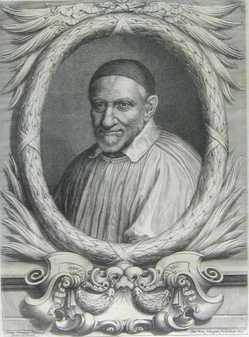 In honoring Saint Vincent de Paul today let's call to mind the myriad of ways he and his spiritual sons and daughters have served, and continue to serve, the Gospel by serving the poor and uneducated. Have you got your copy of the video "Charity's Saint: St Vincent de Paul"? I pray in thanksgiving for the Vincentian priests in New Haven who were my spiritual guides as a child.
In honoring Saint Vincent de Paul today let's call to mind the myriad of ways he and his spiritual sons and daughters have served, and continue to serve, the Gospel by serving the poor and uneducated. Have you got your copy of the video "Charity's Saint: St Vincent de Paul"? I pray in thanksgiving for the Vincentian priests in New Haven who were my spiritual guides as a child.
With glowing light sent from above,
O Vincent, how you guide our way!
Your virtues and example pure
Show us the path to heaven's day.
With self-effacing modesty,
You made yourself of little state;
Your gentleness and simple life
Made you revered by small and great.
Amidst the graces of your life
Your charity sheds brightest fire:
How many of the poor it fed,
Filled many hearts with Christ's desire.
Urged on by zeal and charity,
You preached in town and countryside,
Proclaiming all God's mysteries
To poor and rich, both far and wide.
Beneath your wings you gathered those
Who longed to share both work and strife.
By word and deed you taught them well;
You formed and taught them by your life.
To God, the holy Three-in-One,
All praise and glory be addressed,
Whose life divine is best reward,
And light eternal for the blessed.
J. Michael Thompson
Copyright © 2009, World Library Publications
LM; WINCHESTER NEW, HAMBURG, ST. VINCENT
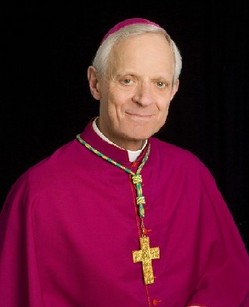 The Archbishop of Washington, Donald W. Wuerl, STD, 70, has been delegated by the Congregation for the Doctrine of the Faith to be the principal guide for those Anglican/Episcopalian clergyman seeking full communion with the Catholic Church, and ordination as a priest.
The Archbishop of Washington, Donald W. Wuerl, STD, 70, has been delegated by the Congregation for the Doctrine of the Faith to be the principal guide for those Anglican/Episcopalian clergyman seeking full communion with the Catholic Church, and ordination as a priest.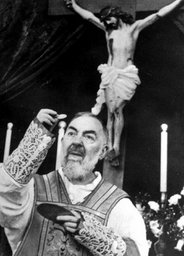
Rejoice, O barren one, who had not given birth; for the behold you have conceived clearly the one who is the dawn of eh Sun Who was about illuminate the whole universe, blighted with sightlessness. Shout in joy, O Zachary, crying in favor, truly, the one to be born is a Prophet of the High. (Troparion, 4th tone)
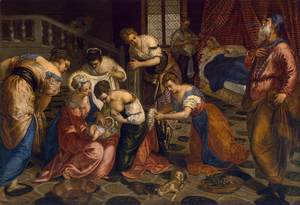
On the Byzantine liturgical calendar, today is the feast of the Conception of Saint John the Baptist. The Eastern Church, at least the Churches with a Greek origin, keeps three conception feasts: Our Lord (March 25), Our Lady (December 9) and the Baptist (September 23). The Latin Church only keeps two.
Calendar study will tell you that only the Savior has a perfect 9-month gestation period; Our Lady is a day under (September 8) and the Baptist, a day under (June 24). The liturgical calendar of the Latin Church places the conception of Mary on December 8, the feast of the Immaculate Conception of the Blessed Virgin Mary.
The theology for today's feast is rooted in the biblical narrative of Zachary and Elizabeth, a couple who had no children and therefore in the eyes of the world plagued by divine disfavor. All of their lives Zachary and Elizabeth begged God to send them a son. Providence heard their prayer and in His plan and mercy for all, ordained that the dawn of salvation would be effected by the birth of John through the agency of the barren Elizabeth. The Church calls John the Prophet and Forerunner of Jesus, the Savior of the world.
Other significant divinely merciful
births to barren women who are a significant part of the Divine Plan of Salvation are Isaac son of Sarah and Samson born to the wife
of Manoah (Samson's mother is not named in Scripture).
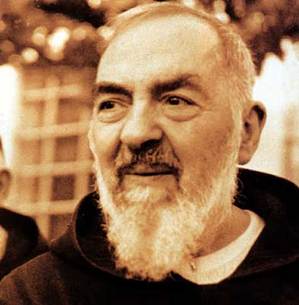
 The pro-life campaign 40 Days for Life begins today, Get involved to save an unborn life.
The pro-life campaign 40 Days for Life begins today, Get involved to save an unborn life.I couldn't follow the Pope's UK trip after very early Friday morning so I find myself reviewing the magnificent papal event. If you've not read Benedict's UK addresses, I highly recommend that you do so. What follows are some of the stunning thoughts of the Holy Father from an education gathering at St Mary's University College. I have to say, when I was in the Catholic school system as a student and as a teacher, the idea of becoming a saint, or at least using the word 'saint' never crossed my mind. Sad to say. Sure we spoke about virtue, grace, sin, sacrament, love, God but we may have talked around the idea of becoming a saint which is not a good thing. BUT becoming a saint has a new currency in my life. The tenderness and clarity of the Pope's address to the youth is nothing but beautiful. The are resonances in the talk of Sts Benedict, Francis, Dominic and Ignatius of Loyola, and Fr Giussani. Here are some excerpts, emphasis mine.

It is not often that a Pope, or indeed anyone else has the opportunity to speak to the students of all the Catholic schools of England, Wales and Scotland at the same time. And since I have the chance now, there is something I very much want to say to you. I hope that among those of you listening to me today there are some of the future saints of the twenty-first century. What God wants most of all for each one of you is that you should become holy. He loves you much more than you could ever begin to imagine, and he wants the very best for you. And by far the best thing for you is to grow in holiness.
Perhaps some of you have never thought about this before. Perhaps some of you think being a saint is not for you. Let me explain what I mean. When we are young, we can usually think of people that we look up to, people we admire, people we want to be like. It could be someone we meet in our daily lives that we hold in great esteem. Or it could be someone famous. We live in a celebrity culture, and young people are often encouraged to model themselves on figures from the world of sport or entertainment. My question for you is this: what are the qualities you see in others that you would most like to have yourselves? What kind of person would you really like to be?
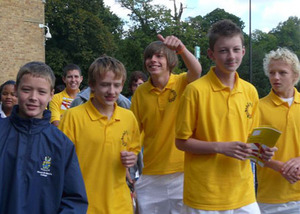
When I invite you to become saints, I am asking you not to be content with second best. I am asking you not to pursue one limited goal and ignore all the others. Having money makes it possible to be generous and to do good in the world, but on its own, it is not enough to make us happy. Being highly skilled in some activity or profession is good, but it will not satisfy us unless we aim for something greater still. It might make us famous, but it will not make us happy.
Happiness is something we all want but one of the great tragedies in this world is that so many people never find it, because they look for it in the wrong places. The key to it is very simple - true happiness is to be found in God. We need to have the courage to place our deepest hopes in God alone, not in money, in a career, in worldly success, or in our relationships with others, but in God. Only he can satisfy the deepest needs of our hearts.
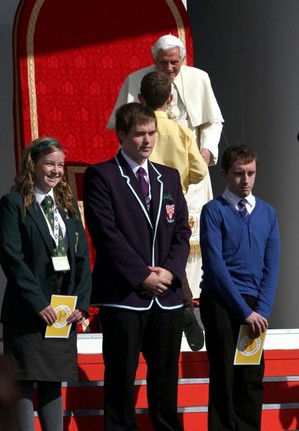
Not only does God love us with a depth and an intensity that we can scarcely begin to comprehend, but he invites us to respond to that love. You all know what it is like when you meet someone interesting and attractive, and you want to be that person's friend. You always hope they will find you interesting and attractive, and want to be your friend. God wants your friendship. And once you enter into friendship with God, everything in your life begins to change. As you come to know him better, you find you want to reflect something of his infinite goodness in your own life. You are attracted to the practice of virtue. You begin to see greed and selfishness and all the other sins for what they really are, destructive and dangerous tendencies that cause deep suffering and do great damage, and you want to avoid falling into that trap yourselves. You begin to feel compassion for people in difficulties and you are eager to do something to help them. You want to come to the aid of the poor and the hungry, you want to comfort the sorrowful, you want to be kind and generous. And once these things begin to matter to you, you are well on the way to becoming saints.
In your Catholic schools, there is always a bigger picture over and above the individual subjects you study, the different skills you learn. All the work you do is placed in the context of growing in friendship with God, and all that flows from that friendship. So you learn not just to be good students, but good citizens, good people. ... Always remember that every subject you study is part of a bigger picture. Never allow yourselves to become narrow. The world needs good scientists, but a scientific outlook becomes dangerously narrow if it ignores the religious or ethical dimension of life, just as religion becomes narrow if it rejects the legitimate contribution of science to our understanding of the world. We need good historians and philosophers and economists, but if the account they give of human life within their particular field is too narrowly focused, they can lead us seriously astray.
A good school provides a rounded education for the whole
person. And a good Catholic school, over and above this, should help all its
students to become saints. I know that there are many non-Catholics studying in
the Catholic schools in Great Britain, and I wish to include all of you in my
words today. I pray that you too will feel encouraged to practise virtue and to
grow in knowledge and friendship with God alongside your Catholic classmates.
You are a reminder to them of the bigger picture that exists outside the
school, and indeed, it is only right that respect and friendship for members of
other religious traditions should be among the virtues learned in a Catholic
school. I hope too that you will want to share with everyone you meet the
values and insights you have learned through the Christian education you have
received.
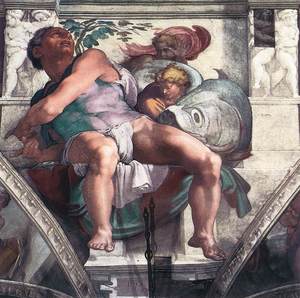 You did pass three days and night within the sea-monster's entrails, showing forth the Lord's descent into the belly of Hades. For when He had freely suffered His saving Passion, He arose out of the sepulcher on the the third day. Hence, we honor you, O Prophet, who wads deemed worthy to be a figure of Christ. (Kontakion, 3rd tone)
You did pass three days and night within the sea-monster's entrails, showing forth the Lord's descent into the belly of Hades. For when He had freely suffered His saving Passion, He arose out of the sepulcher on the the third day. Hence, we honor you, O Prophet, who wads deemed worthy to be a figure of Christ. (Kontakion, 3rd tone)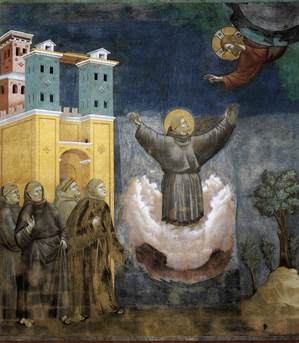
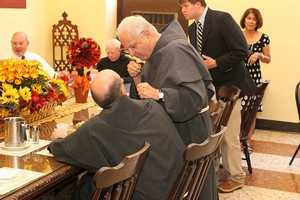
- "dedicate themselves directly and entirely to God in a special manner;
- are conformed more exactly to the type of life Christ the Lord chose for Himself and are united in a special way to the Church and her saving mission;
- stimulate the fervor of their charity through a fuller expression of their baptismal consecration, progress in the life of pilgrims and penitents, and voluntarily deny themselves goods and otherwise highly esteemed."
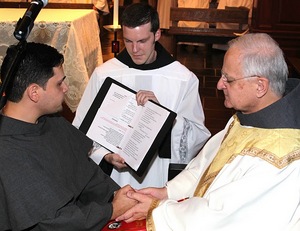
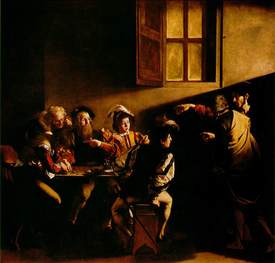
Matthew collected tolls and customs,
Shunned for his work and his dishonesty, Till one day Jesus stood before him, Looked in his face, and told him, "Follow Me!" All that he'd spent his life acquiring, All that he'd scraped and saved and stopred away, Now was no longer worth desiring, Compared with Jesus, Truth and Life and way.
Some of the righteous were offended
That grace should come to such a sinful man. In hopes their hearts might be amended, Jesus explained so they could understand: "Just as the doctor treats the ailing, And passes by the healthy and the whole, So to the stumbling and the failing
I come to offer healing to the soul."
Lord God, who chooses the unworthy,
Who once called out to Matthew, "Follow Me!"
Transform our weakness into glory
And our conceit into humility.
Teach us to know--and to believe it--
That Your unchanging love cannot be earned,
But as Your children we receive it
As did the prodigal when he returned.
Come, all in need of hope or healing,
Come, sick and weak, despondent or ashamed,
Come, bitter, faithless and unfeeling,
Turn your steps home again and be reclaimed!
And you, self-righteous and unbending,
Cast off your pride and your hypocrisy.
Come, leave your life for life unending,
As Matthew did when he heard, "Follow Me!"
(Text by Gail Gillispie)
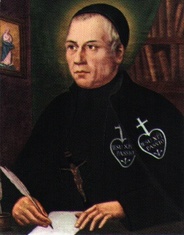
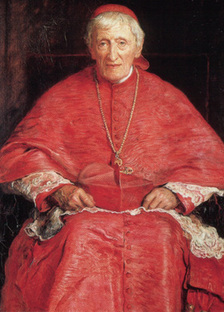
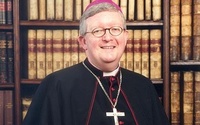
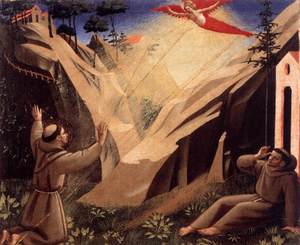
On the plane to Scotland this morning the Pope held the typical Q&A session with reporters. THE more important of the Q&A, in my opinion, is noted below. The questions are vetted prior to the asking.
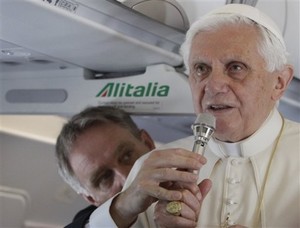
Question:
The UK, like many other Western countries - there is an issue that you have already touched on in the first answer -it is considered a secular country. There is a strong atheist movement, even for cultural reasons. However, there are also signs that religious faith, particularly in Jesus Christ, is still alive on a personal level. What can this mean for Catholics and Anglicans? Can anything be done to make the Church as an institution, more credible and attractive to everyone?
Answer:
I would say that a Church that seeks to be particularly
attractive is already on the wrong path, because the Church does not work for
her own ends, she does not work to increase numbers and thus power. The Church
is at the service of another: she serves, not for herself, not to be a strong
body, rather she serves to make the proclamation of Jesus Christ accessible,
the great truths and great forces of love, reconciling love that appeared in
this figure and that always comes from the presence of Jesus Christ. In this
regard, the Church does not seek to be attractive in and of herself, but must
be transparent for Jesus Christ and to the extent that she is not out for
herself, as a strong and powerful body in the world, that wants power, but is
simply the voice of another, she becomes truly transparent for the great figure
of Christ and the great truth that he has brought to humanity. The power of
love, in this moment one listens, one accepts. The Church should not consider
herself, but help to consider the other and she herself must see and speak of
the other. In this sense, I think, both Anglicans and Catholics have the same
simple task, the same direction to take. If both Anglicans and Catholics see
that the other is not out for themselves but are tools of Christ, children of
the Bridegroom, as Saint John says, if both carry out the priorities of Christ
and not their own, they will come together, because at that time the priority
of Christ unites them and they are no longer competitors seeking the greatest
numbers, but are united in our commitment to the truth of Christ who comes into
this world and so they find each other in a genuine and fruitful ecumenism.
At one point in the Pope's homily in Glasgow, Scotland, today he said:
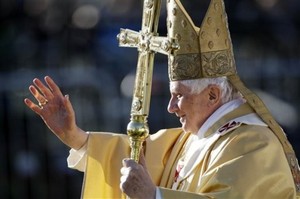
The evangelization of culture is all the more important in our times, when a "dictatorship of relativism" threatens to obscure the unchanging truth about man's nature, his destiny and his ultimate good. There are some who now seek to exclude religious belief from public discourse, to privatize it or even to paint it as a threat to equality and liberty. Yet religion is in fact a guarantee of authentic liberty and respect, leading us to look upon every person as a brother or sister. For this reason I appeal in particular to you, the lay faithful, in accordance with your baptismal calling and mission, not only to be examples of faith in public, but also to put the case for the promotion of faith's wisdom and vision in the public forum. Society today needs clear voices which propose our right to live, not in a jungle of self-destructive and arbitrary freedoms, but in a society which works for the true welfare of its citizens and offers them guidance and protection in the face of their weakness and fragility. Do not be afraid to take up this service to your brothers and sisters, and to the future of your beloved nation.
A few ideas to consider based on what said above:
- notice: the pope speaks about the evangelization of culture, not only evangelization;
- understand: relativism has become dictatorial in all ways, particularly in its approach truth, how it understands true happiness and man's eternal destiny is questioned, abused and rejected as unimportant for the 21st century person;
- question: why and in what ways have some people relegate God, honest intercourse between faith and reason and human dignity to the sidelines, what are the avoiding?, and why do voices of dissent get more credence than eternal truth;
- question: has religion lost its ability to guarantee authentic human liberty?, how can we propose otherwise?;
- question: why do Catholics shy away -perhaps even intimated from making their voice heard in the public square--from talking about their faith in Christ as the supreme savior of all of humanity?;
- how any true notion of what true welfare of people is be neglectful of the unborn, the elderly, prisoners, children, the poor and homeless, etc?
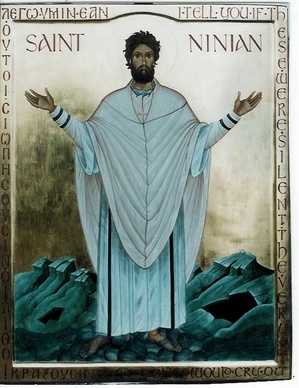
Lord our God, you brought the Picts and Britons to acknowledge of the faith through the teaching of Saint Ninian, the bishop: in your goodness, listen to our prayers: grant that we who have received from him the light of your truth may remain strong in faith and active in works of charity.
"Saint Ninian, whose feast we celebrate today, was himself unafraid to be a lone voice. In the footsteps of the disciples whom our Lord sent forth before him, Ninian was one of the very first Catholic missionaries to bring his fellow Britons the good news of Jesus Christ. His mission church in Galloway became a centre for the first evangelization of this country." (Pope Benedict XVI, September 16, 2010, Glasgow, Scotland)
Let us remember the Holy Father and the people of Scotland today. May the saints of Scotland intercede for them before the Throne of Grace.
This week in Rome the Communio Internationalis Benedictinarum (CIB) for a congress, their 6th, on "Hope in Benedictine Spirituality."
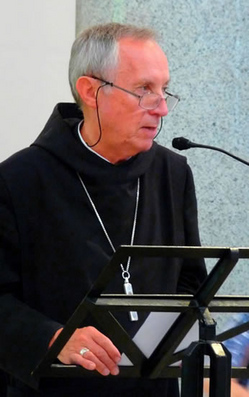
Benedictine nuns and sisters from Europe, Africa and America are attending the meeting. The CIB is meeting on the Aventine Hill at the Primatial Abbey of Saint Anselm (known in Italian as Sant'Anselmo), home to the Abbot Primate , Notker Wolf (pictured left) who heads the confederation of Benedictine monks and nuns, the Pontifical Liturgical Institute, the Mabillion Institute and the college for theological studies for those preparing for ordination, earning degrees in theology and monastic studies (the general link for all these institutes for higher learning is here).
Zenit ran an interview today with Sister Maricarmen Bracamontes de Torreon, a Benedictine sister from Mexico who talked to aspects of hope and how understanding this virtue is key in Benedictine spirituality, and thus for all Christians. Sacred Scripture instructs us to look at how God works with us, that is, He gazes on us with faithfulness, compassion and mercifully. Looking to the holy Rule, Saint Benedict tells us "not to despair of God's mercy" (4.74). Sister Maricarmen said the participants are keenly aware that there is "only one Benedictine heart beats at the bottom of our universal diversity, and on the other, there is no doubt that we are going through a historical moment of darkness and we need a light, precisely like St. Benedict, which shines on high and gives us clarity in the midst of darkness."
Two questions of the interview are worth thinking about here on the Communio blog:
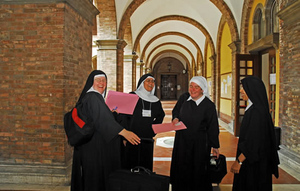
ZENIT: Can we then speak of a reflection from a holistic-rational perspective?
Sister Bracamontes: The Benedictine way leads to a process of integration that embraces the different dimensions of the human conscience: cognitive (the mind), affective (the heart), ethics and morals (the will and all its capacities), religious (the soul).
This integration enables us to love in a unified way and it is the condition to advance on the path of conversion. "However, the workshop where we must practice all these things diligently is the enclosure of the monastery and stability in the community" (Rule of Benedict, 4.78). The monastic dynamic animates the processes of integration in those who live in the "monastery," which is the place where we ask God with the most insistent prayers to bring to completion the divine work of our lives: that they all may be one.
If we persevere, trying to live in the "conversatio," the experience of God's unconditional love gradually integrates all the dimensions of our being, and thus we become unified in ourselves and in the diversity and plurality that characterizes us. The result of all this is that we live with transparency and consistency, that we do not separate our judgments from our feelings, or our conduct from our belief. In this way, our integrity and social and personal responsibility will not allow us "to say one thing and do another," or to establish ourselves in a life of contradictions and inconsistencies.
ZENIT: At present the Church is facing difficult moments. Does it call for hope?
Sister Bracamontes: Obviously. I think that some sectors of the Church have slipped up in the dialogue with the signs of the times that was so encouraged by the Second Vatican Council.
Those signs have revealed that for centuries, both in the society as well as the Church, efforts were dedicated to contain diversity and plurality, so characteristic of humanity. There are many human groups, with different views of reality; they are arriving on the first plane and ask that they be recognized, respected and integrated. The new methods of understanding and of discovery of humanity leave antiquated the old systems of relationship based on dominion, submission and marginalization. These systems of the past considered some human beings superior to others, based on race, gender, social class, ideology, religion, etc.
In face of a clearer awareness of the common dignity of all human beings, the absence of dialogue between those who are open to the signs of the times and those who continue to adhere to visions of the past and close their mind and heart to the historic change that we are experiencing, calls for hope.
From a perspective of faith, we are conscious and are convinced
that the whole of humanity, with its differences, has been created with equal
dignity in the divine image and likeness. We are children of God and sisters
and brothers among ourselves in Christ, who is our peace (Ephesians 2:14), and
in him all discrimination and marginalization is overcome (Galatians 3:26-28).
From this awareness we hear the call and we open ourselves with wisdom and
maturity to our world with its urgent need to recognize diversity, to promote
integration and to encourage dialogue and participation. Hence, many challenges
arise.
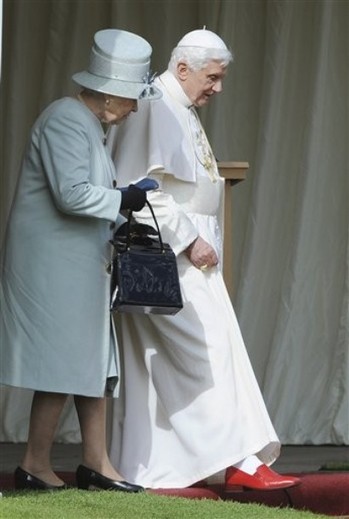
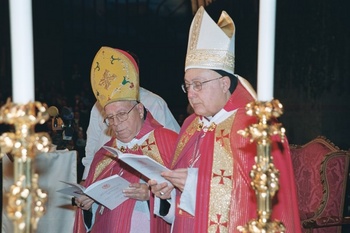 With great sadness word was received today of the passing to the Lord of His Excellency, Archbishop Francis Mansour Zayek, 90, emeritus archbishop of the Eparchy of Saint Maron of Brooklyn, on the 14 September 2010, the Exaltation of the Holy Cross.
With great sadness word was received today of the passing to the Lord of His Excellency, Archbishop Francis Mansour Zayek, 90, emeritus archbishop of the Eparchy of Saint Maron of Brooklyn, on the 14 September 2010, the Exaltation of the Holy Cross.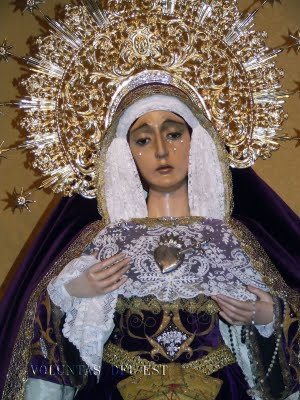 There is certain richness these days in the liturgical memorials given to us by the Church (remember on St John Chrysostom on the 13th, the Exaltation of the Holy Cross on the 14th and Sts Cornelius and Cyprian on the 16th), all pointing to the meaning real Christian witness: that radical, honest, hopeful Christian discipleship means following Christ to the cross, adoring His sacred Passion and living as redeemed persons.
There is certain richness these days in the liturgical memorials given to us by the Church (remember on St John Chrysostom on the 13th, the Exaltation of the Holy Cross on the 14th and Sts Cornelius and Cyprian on the 16th), all pointing to the meaning real Christian witness: that radical, honest, hopeful Christian discipleship means following Christ to the cross, adoring His sacred Passion and living as redeemed persons.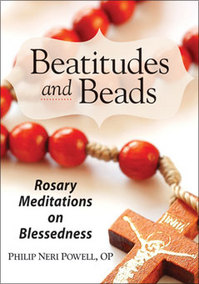 Beatitudes and Beads is a 32 page booklet guides the user through the Beatitudes of the Sermon on the Mount, often called Lord's Commandments which have the same force as the Decalogue. Beatitudes and Beads gives the user the original rosary with meditations on the Eight Beatitudes.
Beatitudes and Beads is a 32 page booklet guides the user through the Beatitudes of the Sermon on the Mount, often called Lord's Commandments which have the same force as the Decalogue. Beatitudes and Beads gives the user the original rosary with meditations on the Eight Beatitudes.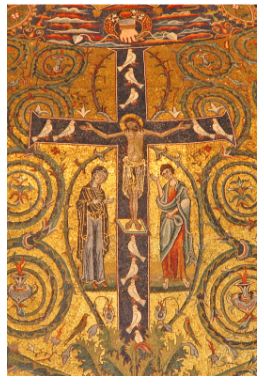

... it opens up and broadens the horizons of human awareness, pointing us beyond ourselves, bringing us face to face with the abyss of Infinity, can become a path towards the transcendent, towards the ultimate Mystery, towards God. Art, in all its forms, at the point where it encounters the great questions of our existence, the fundamental themes that give life its meaning, can take on a religious quality, thereby turning into a path of profound inner reflection and spirituality. This close proximity, this harmony between the journey of faith and the artist's path is attested by countless artworks that are based upon the personalities, the stories, the symbols of that immense deposit of "figures" --in the broad sense-- namely the Bible, the Sacred Scriptures. The great biblical narratives, themes, images and parables have inspired innumerable masterpieces in every sector of the arts, just as they have spoken to the hearts of believers in every generation through the works of craftsmanship and folk art, that are no less eloquent and evocative.
The following flyer is being distributed by the lay ecclesial movement Communion and Liberation this weekend as a humble attempt to understand, in a serious way, what the Ground Zero-Mosque building proposal means in light of our saying we believe that Jesus Christ makes a difference in the way we live and see reality around us, and how He is truly present among us. If we really believe that Christ abides with us, then how do you (we) evaluate value of the current Christian-Muslim-unbeliever tensions? Do we, as believers, assess reality according to the way everyone else does, or do we Christians assess reality in a new way, in the way Christ sees reality?
The proposed construction of an Islamic center and mosque at Ground Zero has resulted in the outrage of many Americans and the recent public discussion about "Islamophobia" in America. These events provoke us to affirm the following:
1. We notice a growing tendency to manipulate circumstances to serve as a pretext to create a public furor that demands people make a choice between one of two pre -packaged, ideological positions. We refuse to engage in a debate about whether or not to build a mosque at Ground Zero. The reality of Islam in America brings up questions that go much deeper than that of the construction of one mosque. Indeed, one critical and open question is how contemporary American culture comes to grips with the human person's religious sense.
2. Many of those among the cultural elite, as well as many who hold the levers of power in our nation, have abandoned the religious tradition that informed the lives of the vast majority of their ancestors: Christianity. They have reduced it to a moral code or a vague myth, linked to a man dead for more than 2,000 years. Instead, they have embraced a "scientific" outlook on human life. But science provides no answer to those questions that continuously gnaw at the human heart, such as the problem of justice, the meaning of human life, or the problems of suffering and evil. In fact, science tends to stifle them. Hence, contemporary American culture finds itself weak and tremendously uncertain about any response to universal human inquiries and longings.
3. Just over two weeks ago, we marked the 100th anniversary of Mother Teresa of Calcutta's birth. One who looks at her sees a resplendent human person, overflowing with love for everyone, especially strangers of different religions. Her humanity touched all: religious and atheist; Muslim and Hindu; rich and poor. Mother Teresa's life invites anyone who seeks truth to open his or her heart and mind and take a fresh look at Christianity.
4. For serious Christians, the challenge of Islam, the large-scale abandonment of Christianity, the emptiness of the dominant culture, and the witness of Mother Teresa signal the urgent need for conversion. Pope Benedict XVI recently said that "conversion...is not a mere moral decision that rectifies our conduct in life, but rather a choice of faith that wholly involves us in close communion with Jesus as a real and living Person." The Pope brings us face to face with the defining difference between Christianity and Islam: one religion bases its response to the human person's religious sense upon a message delivered 1,400 years ago, while the other offers the experience of a Man who died but is alive and present with us today. As Fr. Juliàn Carròn, President of the Fraternity of Communion and Liberation, recently affirmed: Jesus' message and even all the miracles He performed were not enough to overcome the sadness of His disciples on the road to Emmaus --only His risen presence could ignite their hearts once again.
5. We are not Islamophobic, nor do we fear our post-modern world. On the contrary, we invite all to look at Mother Teresa and at the Man to whom she gave her life. In His Person, present with us today, all can find the Truth that alone will deliver the freedom America promises.
Communion and LiberationSeptember 11, 2010
Notes
Benedict XVI, General Audience, Paul VI Audience Hall, Wednesday, February 17, 2010 (http://www.vatican.va/holy_father/benedict_xvi/audiences/2010/documents/hf_ben-xvi_aud_20100217_en.html)
cfr. Luke 24: 13-35
Here's the text for easy printing: CL Sept 11, 2010 Flyer.pdf
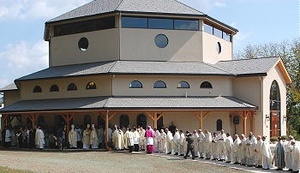 Zacchaeus, make haste, and come down; for today I must abide at thy house. And he made haste, and came down, and received him joyfully into his house. This day is salvation come to this house from the Lord, alleluia.
Zacchaeus, make haste, and come down; for today I must abide at thy house. And he made haste, and came down, and received him joyfully into his house. This day is salvation come to this house from the Lord, alleluia.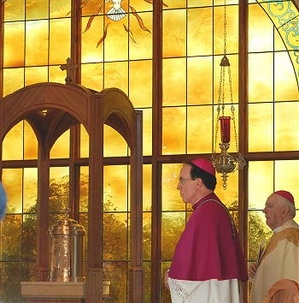

- a common prayer life and personal prayer which includes Mass, the Divine Office, Adoration of the Blessed Sacrament, Lectio Divina, the rosary; a daily hour could be optional but there ought to be a good reason why a religious is not making a holy hour more often than not;
- a common vision for living and serving the gospel in the Catholic Church as it is today, not as the Church "was in the 1970s, 1980s, 1990s" or what the Church "should be"; the work done together, whether serving the poor, teaching school, being chaplains needs to cohere to the founding charism, be done together, and with joy in the Risen Lord; serving the gospel and the Church means being faithful to the Church's teaching authority, which means pastoral authority of the Pope and the bishops;
- a caring fraternal life
- the wearing of a religious habit not only in the house but in public; if you won't wear the habit in a restaurant or movie theater or any other place, including the airport, then you shouldn't be there; the wearing of the roman collar for religious orders should be done by exception if there is a legitimate habit available and the lapel pin just doesn't cut it.


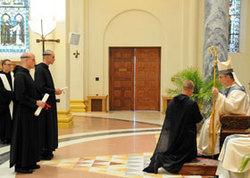
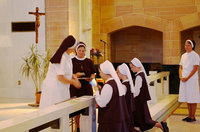
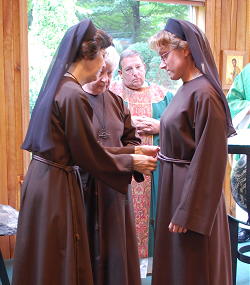
Today, the Director of the Liturgical Institute at Mundelein Seminary, Father Douglas Martis, gave the following address today. Father Martis is a priest of the Diocese of Joliet and on the faculty of Mundelein Seminary. Some very useful lessons to keep in mind.
I. Sons.
My Dear Sons,
This was the term used by Fr. Fuller on Monday morning, "sons." It is a beautiful expression. You are sons to us. Our relationship, despite the distance or proximity of age, is one of father and son, or in certain cases, as with our Director of Music, one of motherly concern. No disrespect to your age or your experience is intended.
We have a common project here, to prepare you for ministry to the Church as priests.
And for those of us concerned directly with your liturgical formation, our project is to prepare you in such a way as to manifest an authentic and profound intelligence of and respect for the Church's public prayer, so as to demonstrate a true love for God's people.
This responsibility belongs jointly to you and to us. While it is true that in some ways you are brothers, on another day you will be brothers in a deeper sense. For now, you sons, we love you, and care for you, and want genuinely go give to you what parents give to beloved sons.
What we do, that to which we have committed these years of our lives, is for your good for the good of the Church.
My colleagues and I have strong personalities. We do not have an innate need to challenge you or correct you in order to caress on own self-importance. The program we have of liturgical preparation and celebration, of respecting ritual and integrating prayer, of insisting on music and chant is not the imposition of our own puny personal preferences.
Our teaching is derived from the desire of the Church herself: rooted inSacrosanctum concilium, the ritual books that are the fruit of the Council, and the Church's liturgical theology.
It is neither our interest nor our agenda to promote our opinions as if they carried the authority of the Church. Our desire is to present you with the Church's teaching, for love of you and love of her.
We want you to follow our example.
II. Change.
Things change. That's okay.
Get used to it. New classmates, new teachers, new schedules. New prayers, new responsibilities, new living situations. New circumstances, new trends, new conflicts. New joys, new insights, new challenges.
This is the life of a priest in the 21st century.
Learning to navigate change is an essential skill you will need for the rest of your lives.
Let us be clear. God remains the same. Our upset, generally has more to do with what we want,than with the objective reality of the change. This is not about you.
The church of the 1960s saw excitement and enthusiasm, and resistance, too.
In your situation today, learn to appreciate your elders' excitement, enthusiasm, and resistance. In 2011 you will know the same. Excitement, enthusiasm, and resistance.
Change leads some to heresy or schism.
Avoid the temptation of being captured by the caricatures of the media, whether your news source is FOX or CNN, whether you are a fan of NCReporter or NCRegister whether you get your information from the blogs or from television. Do not allow yourself to get sucked in by the politics of resistance. When change leads to dissemblance, only the devil is served.
As priests, ministers, official representatives of the Church, you have a greater responsibility than settling for, or promoting polemics. Not only that, as a man of prayer, you have--even now!--the responsibility of learning to embrace the beauty, the rich theology, the deep spirituality of the Church's liturgical prayer.
You can stand aloof as a member of an elite that knows the rich treasure of prayer or having integrated it yourself you can teach, inform, model, and so help others to do the same.
What is needed here is not a so called "pastoral decision" of diluting prayer but a conviction of genuine care, catechesis and formation that raises up the faithful.
This may be the greatest ecclesial moment in your lifetime. Yours is not the only generation to have ever known liturgical change.
"We are not in the same situation as ... 1963. One cannot therefore continue to speak of a change as it was spoken of at the time of the Constitution'spublication; rather one has to speak of an ever deeper grasp of the Liturgy of the Church, celebrated according to the current books and lived above all as a reality in the spiritual order."[i]
...now the time has come ... to publish liturgical books in a form that both testifies to the stability achieved and is worthy of the mysteries celebrated.[ii]"
If the intuition of Pope John Paul II is correct, if the Third Edition of the Roman Missal signals the maturity of liturgical reform, its dignity and stability, then the post-Counciliar church has survived adolescence and provides the opportunity now for a more adult expression of faith. You and I stand on the threshold of this moment!
III. Texts.
The challenge with public prayer has always been to make the words our own. Let us understand then, that the great opportunity afforded us in this moment is not one of changing words. This is about opening a more direct path to the meaning of Catholic worship--a meaning that has always been there and is there even now in the texts we use today.
What, then, are we to do?
Here is the simple prescription:
Take the words,
learn to understand them,
make the connections.
Follow the example of ancient readers:
take the text, do not read it through as if you already understand [this "mystery ever ancient, ever new!"] take the text, dwell there. Abide between the lines.[iii]
"This quality of reading, which enables a reader to acquire a text not simply by perusing the words but by actually making them part of the reader's self..."[iv] Here is found true blessing.
Know what you are doing. Listen for the biblical narrative. The texts of the Mass were not put there by some malicious committee looking to trip you up. These texts resound with the voice of God's own Word. Find the origin, search the reference.
I know this is not easy. We live in a culture that does not foster this kind of connection. Contemporary culture thrives on sound bites; idolizes short cuts and Cliffnotes, Sparknotes and books for dummies.
For your part, claim your place in Catholic culture, with its own language and grammar, its own symbols and meaning.
Plunge yourself in a baptism of the Church's signs. Let the insight of your patristic reading anoint your understanding and illumine your prayer. Open your eyes to what is around, even here on this campus, with its natural beauty, its architectural wonders, its volumes of wisdom, and its varied residents.
A steady diet of this, an habitual practice of attention to everything is an essential preparation for prayer. Collect these insights, engage these people, absorb this environment.
Your responsibility as seminarian, is to learn this, to integrate it; then you must model it for others and teach it to those in your care.
You become a mystagogue.
IV. Now.
This begins now. You do not have to wait. You walk out of this auditorium and cross a threshold.
Let that crossing be the crossing of every threshold.
Let every word of the Mass bring you to a biblical narrative, a theological insight, a pastoral encounter.
Let every sign of the Cross bring you to the mount of the Ascension.[v] Let it be, every time, a wrapping yourself in the Trinity, a conforming yourself to the cross of Christ. May it bring you back to your baptism and forward to your funeral. May it inspire the crosses you may trace some day on the breast of future neophytes, on the foreheads of the anointed, on the palms of priests.
Let every greeting of the Mass resound with the words of the great missionary Paul,[vi] or the salutation of Boaz to harvesters,[vii] or the words of the Risen Christ.[viii]
Let every response, whether it be "And also with you" now or "And with your spirit" at another time, let this reply make us marvel at God's wisdom in Ordering the Church and in the Spirit's work of assembling members with different gifts into one holy body.
Let every procession remind us of life's pilgrimage to heaven; every standing be in implicit imitation of the Great High Priest: "Here I am, Lord. I come to do your will."[ix] Let every genuflection, every bow be the humble acknowledgement of what God has done for us in Christ Jesus.
Let our stance at the Alleluia be so completely devoted to the praise of Christ present in the Word, that rather than tracking the deacon and registering ritual glitches, our minds, bodies and voices melt into the Eternal.
Let prayers in the preparation of bread and wine, bring us to Daniel's fiery furnace, so that the words of Azariah become our own: we have nothing else to offer, but with contrite hearts and humble spirits let us be received.[x] And may the dew-laden breeze[xi] that soothed the heat of that inferno, come like dew in the desert,[xii] to provide us with our daily bread."Priests of the Lord, bless the Lord." [xiii]
Let every dismissal, GO! bring us back again to Ascension,[xiv] and to every sending of Christ: "You, too, go to the vineyard!"[xv]
Do you see? At every moment, at every turn, around every corner, the bible is there. A prayer, a doctrine, an insight. And it has been there all along.
All we have, are, do, everything we love... is here.
Learning this. Integrating this. Modeling this. Teaching it is our project.
Will you make it your project too?
Notes
[i] Vicesimus quintus annus, 1988, 14.
[ii] VQA, 20.
[iii] Alberto Manguel: A History of Reading. "You did not read books through; you dwelt, abided between their lines and, reopening them after an interval, surprised yourself at the spot where you had halted.", 12.
[iv] Manguel, 58.
[v] Mt 28:19.
[vi] 2 Cor 13:13 et al.
[vii] Ruth 2:4.
[viii] Jn 20:19.
[ix] Heb 10:9.
[x] Dan 3:39-40.
[xi] Dan 3:50.
[xii] Ex 16:13-17.
[xiii] Dan 3:84.
[xiv] Mt 28:19.
[xv] Mt 20.D
On this our liturgical remembrance of Our Lady's birthday, it is apt to recall what Saint Andrew of Crete, preached:
This is the highest, all-embracing benefit that Christ has bestowed upon us. This is the revelation of the mystery, this is the emptying-out of the divine nature, the union of God and man, and the deification of the manhood that was assumed. This radiant and manifest coming of God to men most certainly needed a joyful prelude to introduce the great gift of salvation to us. The present festival --the nativity of the Theotokos-- is that prelude, while the final act is the foreordained union of the Word with flesh. Today the Virgin is born, tended and formed, and prepared for her role as Mother of God, that God who is the universal King of all the ages!
With the choirs of saints and angels,Let the Church be joined as one,
Binding earth to highest heaven,
Praising Jesus, Mary's Son
Son of God-the Father's glory
Who took flesh that we might be
Reconciled, reborn, forgiven,
From the pow'r of sin set free!
On this solemn, joyful feast dayLet us sing a song of praise,
Thanking God for Mary's witness
Faithfully kept all her days.
From her birth to blessed Anna,
Mary listened to God's word,
And, when summoned by the angel,
Lived in faith what she had heard.
Glory now to God the Father,Who has made us for his own;
Glory now to Christ our Savior,
Who has raised us to his throne;
Glory now to God the Spirit,
Who renews us in his grace:
Laud and honor, never ceasing,
Be to God from all our race!
J. Michael Thompson
Copyright © 2009, World Library Publications
87 87 D; PLEADING SAVIOR, or IN BABILONE

Prayer for the Canonization of Blessed Frederic Ozanam
God, our Father, You alone have the power to bestow those precious gifts of yours which we rightly call miracles. If it be Your will, be pleased to grant such a gift on behalf of [mention a person's name here]. We humbly ask that You grant this favor so that Blessed Frederic Ozanam may be canonized by our Holy Mother the Church. We make this prayer through our Lord Jesus Christ, Your Son. Amen.
The name "Frederic Ozanam" may not be well-known to many in the USA, but those who know of or work with the Saint Vincent de Paul Society know well their father in the faith and their founder. Ozanam followed in the foot steps of Saint Vincent de Paul and is a terrific model for all people, particularly the laity because he puts the gospel and the Liturgy into action.
The Saint Vincent de Paul Society has a membership of more than three-quarters of a million people in 47, 000 conferences in 131 countries on 5 continents.
Frederic Ozanam was a married man, a father, well educated, a person who travelled in high society, a man of faith and action. Many people today consider Blessed Frederic to be a precursor to the Second Vatican Council's vision of the laity in the Church.
Ozanam's vision of the Church can be seen in an address he gave on the 4 marks of the Church (one, holy, catholic and apostolic). Here is an excerpt of a talk he gave:
One
One only means of salvation remains to us, that is, that Christians, in the name of love, interpose between the two camps (of rich and poor) passing like beneficent deserters from one to the other ... communicating mutual charity to all, until this charity, paralyzing and stifling the egotism of both parties, and every day lessening their antipathies, shall bid the two camps arise and break down the barriers of prejudice, and cast aside their weapons of anger and march forth to meet each other, not to fight but to mingle together in one embrace, so that they may form but one fold under one pastor.
Holy
Will we be satisfied to lament the barrenness of the present time, when each bears in his heart a germ of holiness, which a simple desire would be sufficient to develop? It we do not know how to love God as the saints did, it is because we see God with the eyes of faith alone, and faith is so weak. But the poor we see with the eyes of flesh. They are present. We can put our fingers and our hands into their wounds, the marks of the crown of thorns are plainly visible on their heads. There is no place for unbelief here ... You poor are the visible image of the God whom we do not see, but whom we love in loving you.
Catholic
A Catholic university (Louvain) should be a cause of rejoicing to the Church, to see raised within her yet another monument to the immortal alliance of Science and Faith.
Apostolic
You have felt the emptiness of material pleasures, you
have felt the hunger for truth crying out within you; you have gone for light
and comfort to the barren philosophy of modern apostles. You have not found
food for your souls there. The religion of your forefathers appears before you
today with full hands; do not turn away, for it is generous. It also, like you,
is young. It does not grow old with the world. Ever renewing itself, it keeps
pace with progress, and it alone leads to perfection.
More about Blessed Frederic Ozanam can be read here, his chronology, and a brief biography.
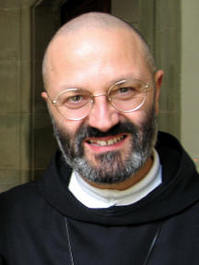 The General Chapter of the Order of Cistercians elected Dom Mauro-Giuseppe Lepori, 52, as their new Abbot General, succeeding Abbot Mauro Estevez. It is reported that Lepori received 109 of 134 votes. His work as abbot general will last for the next 10 years with about 1700 monks and nuns of the Order of Cistercians throughout the world.
The General Chapter of the Order of Cistercians elected Dom Mauro-Giuseppe Lepori, 52, as their new Abbot General, succeeding Abbot Mauro Estevez. It is reported that Lepori received 109 of 134 votes. His work as abbot general will last for the next 10 years with about 1700 monks and nuns of the Order of Cistercians throughout the world.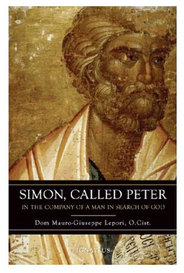
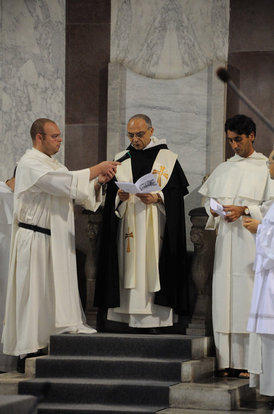 The 2010 Dominican General Chapter opened on August 31st (and will close on September 21st) and the 130 capitulars elected Father Bruno Cadoré, 55, as the 86th successor of Saint Dominic; he immediately succeeds Father Carlos Aspiroz Costa who has served for the last 9 years. Father Bruno, until now, has been the Prior Provincial of the French Province and trained as a pediatrics physician with an interest in child hematology and in bio-ethics. He's also lived and worked in Haiti.
The 2010 Dominican General Chapter opened on August 31st (and will close on September 21st) and the 130 capitulars elected Father Bruno Cadoré, 55, as the 86th successor of Saint Dominic; he immediately succeeds Father Carlos Aspiroz Costa who has served for the last 9 years. Father Bruno, until now, has been the Prior Provincial of the French Province and trained as a pediatrics physician with an interest in child hematology and in bio-ethics. He's also lived and worked in Haiti.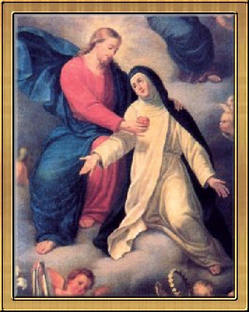 O Lord, our hope, You enriched Blessed Catherine with an abundance of heavenly gifts and filled her heart with You alone. With the help of her prayers may Christ be fastened to our hearts as He was fastened to the cross for our salvation.
O Lord, our hope, You enriched Blessed Catherine with an abundance of heavenly gifts and filled her heart with You alone. With the help of her prayers may Christ be fastened to our hearts as He was fastened to the cross for our salvation.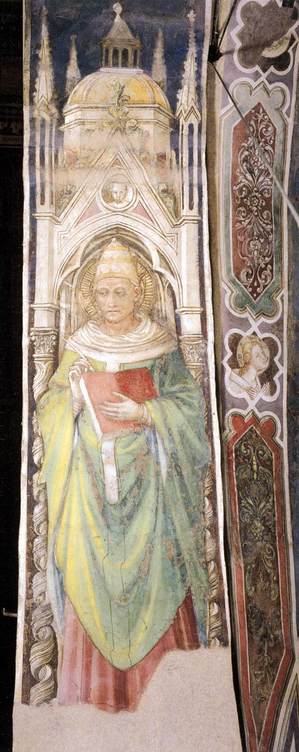
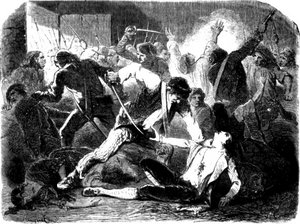 The Benedictines and Carmelites in some places in the USA, and of course in England and France, liturgically remember the September Martyrs, also called the Paris Martyrs; you will also see the memorial listed as "Blessed John du Lau and companions" after the Archbishop of Arles, the highest ranking prelate among the 191 martyrs. The Benedictine nuns of Stanbrook Abbey are connected with the Carmelite nuns and retain some of the relics. Historians tells us that about 1500 clergy and religious were killed in 1792. And this act of martyrdom inspired the writing of Georeges Bernanos's "Dialogues of the Carmelites" and the famous opera of Francis Poulenc, by the same name.
The Benedictines and Carmelites in some places in the USA, and of course in England and France, liturgically remember the September Martyrs, also called the Paris Martyrs; you will also see the memorial listed as "Blessed John du Lau and companions" after the Archbishop of Arles, the highest ranking prelate among the 191 martyrs. The Benedictine nuns of Stanbrook Abbey are connected with the Carmelite nuns and retain some of the relics. Historians tells us that about 1500 clergy and religious were killed in 1792. And this act of martyrdom inspired the writing of Georeges Bernanos's "Dialogues of the Carmelites" and the famous opera of Francis Poulenc, by the same name.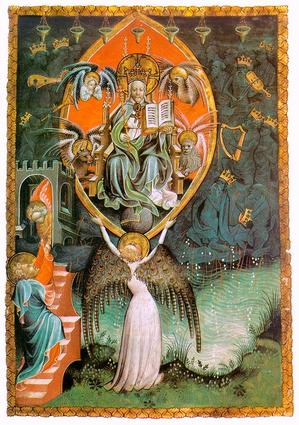
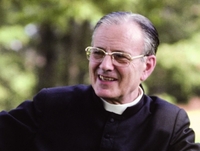 The Archdiocese of Boston and Opus Dei have begun in earnest the study of the cause of saint of Father Joseph Muzquiz. Muzquiz labored in the Boston area for many years and died there in 1981. These first steps are being taken to do a proper investigation in possibility of presenting a cause for sainthood to the Church.
The Archdiocese of Boston and Opus Dei have begun in earnest the study of the cause of saint of Father Joseph Muzquiz. Muzquiz labored in the Boston area for many years and died there in 1981. These first steps are being taken to do a proper investigation in possibility of presenting a cause for sainthood to the Church.